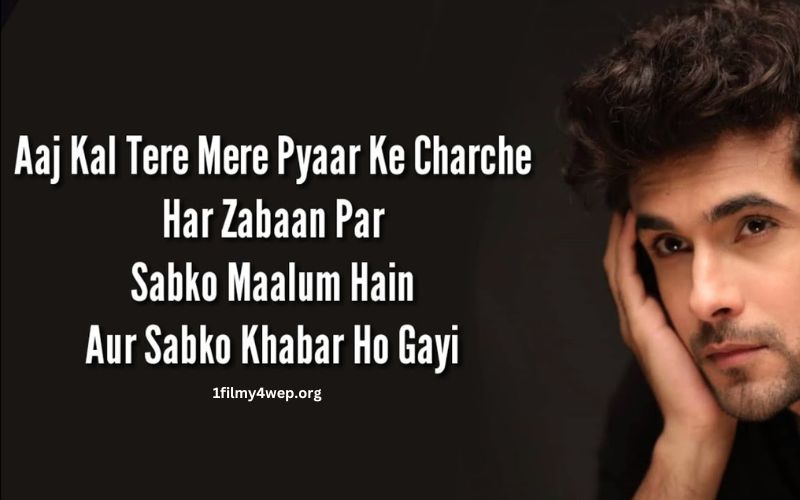“Aaj Kal Tere Mere Pyar Ke Charche” is a song that epitomizes the vibrant and romantic spirit of Bollywood in the 1960s. From its catchy tune to its playful lyrics, this song has become a timeless piece that continues to resonate with audiences even decades after its release. To truly appreciate the charm and significance of “Aaj Kal Tere Mere Pyar Ke Charche,” it is essential to delve into its origins, the context within which it was created, and its lasting impact on Indian cinema and music.
Origins and Context
The song “Aaj Kal Tere Mere Pyar Ke Charche” is from the 1968 Bollywood film Brahmachari, directed by Bhappi Sonie and produced by G.P. Sippy. The film starred the ever-charismatic Shammi Kapoor and the elegant Rajshree in the lead roles. The music for the film was composed by the legendary Shankar-Jaikishan duo, and the lyrics were penned by Hasrat Jaipuri. The song was beautifully sung by Mohammed Rafi and Suman Kalyanpur, two of the most prominent voices of that era.
“Brahmachari” tells the story of a kind-hearted and altruistic man, Brahmachari (played by Shammi Kapoor), who runs an orphanage and dedicates his life to helping others. The film was a commercial success and earned Shammi Kapoor the Filmfare Award for Best Actor. The soundtrack, particularly “Aaj Kal Tere Mere Pyar Ke Charche,” played a significant role in the film’s popularity.
The Lyrics and Their Meaning
The lyrics of “Aaj Kal Tere Mere Pyar Ke Charche” are playful and flirtatious, capturing the essence of budding romance. They speak of the widespread gossip about the love between the protagonists and celebrate the joy and excitement of their relationship. Here is a closer look at the lyrics:
Aaj kal tere mere pyar ke charche har zubaan par
Sab ko maaloom hai aur sab ko khabar ho gayi
Haan humko maaloom hai, sab ko khabar ho gayi
Translated, this means:
These days, talks of our love are on everyone's lips
Everyone knows, and everyone has become aware
Yes, we know, and everyone has become aware
The lyrics continue in this light-hearted manner, with each verse adding to the narrative of a love that has captured the attention of all. The repetition of phrases emphasizes the widespread nature of the gossip and the mutual acknowledgment of the lovers about their relationship being the talk of the town.
Musical Composition
The music of “Aaj Kal Tere Mere Pyar Ke Charche” is a testament to the genius of Shankar-Jaikishan. The composition is lively and upbeat, featuring a blend of Western and Indian musical elements. The use of brass instruments, strings, and rhythmic percussion creates a dynamic and infectious melody that perfectly complements the playful nature of the lyrics.
The song starts with a vibrant introduction, immediately setting a cheerful tone. The interludes are marked by instrumental solos that add to the overall energy of the song. The seamless integration of Mohammed Rafi and Suman Kalyanpur’s voices with the orchestration creates a harmonious and delightful auditory experience.
Performance and Choreography
The on-screen performance of “Aaj Kal Tere Mere Pyar Ke Charche” is equally memorable. Shammi Kapoor, known for his energetic and expressive dance style, brings the song to life with his charismatic presence. Rajshree matches his energy with grace and elegance, making the pair’s chemistry palpable on screen. The choreography is playful and spontaneous, reflecting the carefree and joyous nature of young love.
The song sequence is set in a vibrant and colorful environment, which enhances the overall visual appeal. The backdrop of scenic locations and stylish costumes further adds to the charm of the performance, making it a visual treat for the audience.
Cultural Impact and Legacy
Over the years, “Aaj Kal Tere Mere Pyar Ke Charche” has transcended its initial popularity to become an iconic song in Indian cinema. It is often played at weddings, parties, and other celebratory events, where its infectious energy continues to bring joy to people of all ages. The song’s timeless appeal lies in its ability to capture the universal emotions of love and excitement, making it relatable to generations of listeners.
The song has also been covered and remixed by various artists, showcasing its enduring influence on Indian music. Its melody and lyrics have been reinterpreted in different styles, from classical renditions to modern pop versions, demonstrating its versatility and wide appeal.
In addition to its musical impact, “Aaj Kal Tere Mere Pyar Ke Charche” holds a special place in the hearts of Bollywood enthusiasts. It is often referenced in popular culture, and its iconic status is cemented by its frequent appearances in films, television shows, and advertisements. The song’s legacy is a testament to the enduring charm of the golden era of Bollywood music and cinema.
Conclusion
“Aaj Kal Tere Mere Pyar Ke Charche” is more than just a song; it is a celebration of love, joy, and the magic of Bollywood. Its playful lyrics, vibrant music, and memorable performances have made it a timeless classic that continues to resonate with audiences across generations. As we look back at the rich history of Indian cinema, this song stands out as a shining example of the creativity, talent, and spirit that define Bollywood’s golden era. Whether you are a longtime fan or a newcomer to this classic, “Aaj Kal Tere Mere Pyar Ke Charche” is sure to leave you with a smile on your face and a song in your heart.

